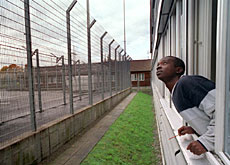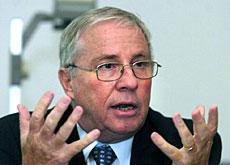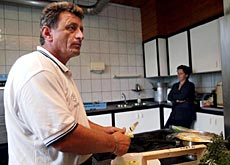Asylum seekers face more restrictions

A House of Representatives committee has called for tougher measures to reduce criminal acts by asylum seekers, not long before a crucial debate in parliament.
The committee has suggested further restricting asylum seekers’ movements and possibly banning them from certain places when they first enter Switzerland.
It presented its conclusions after reviewing a report issued in April on restrictions placed on asylum seekers over the past ten years.
“We could, for example, ban asylum seekers from entering certain urban areas, or even from leaving the centre where they are based during their first six months in the country,” Christian Democrat parliamentarian Lucrezia Meier-Schatz said on Tuesday.
Besides restricting freedom of movement, the committee also wants to force asylum seekers to take part in occupational programmes.
“These measures are aimed at dissuading people who want to use the asylum procedure to enter Switzerland and commit crimes,” added Radical Jean-Paul Glasson.
According to Glasson, these restrictions would not constitute “huge obstacles for those who are truly seeking help and protection”. He added that the crime rate among asylum seekers – especially during the first 12 months in Switzerland – was higher than among the resident population.
Asylum law revision
The committee wants to see these two measures added to the latest revision of Switzerland’s asylum law, which is due to be debated in parliament in October.
But the committee voiced scepticism about other planned measures, such as a doubling of the detention period before expulsion.
Committee members questioned the sense in locking someone up for 18 months because they had refused to cooperate with the authorities.
The committee also complained about how the cantons handled rejected asylum seekers, saying that after ten years of experimentation, it was time for a unified approach.
In canton Geneva, only seven per cent of those who are to be expelled are locked up, while in Zurich it is 95 per cent. Yet the number of asylum seekers who face expulsion is the same in both cantons.
Asylum rules were already tightened more than a year ago after parliament decided to strip rejected asylum seekers of the right to claim social security benefits.
Swiss Justice Minister Christoph Blocher said last week requests for asylum had fallen by 42 per cent since parliament’s decision.
Blocher, who is a member of the rightwing Swiss People’s Party, added that fears that large numbers of rejected asylum seekers would turn to crime had proved unfounded.
The rate did double from 3.7 per cent to 7.4 per cent, but this had to be balanced against the large drop in asylum-seeker numbers, according to the justice minister.
But the Swiss Refugee Council criticised the tougher measures introduced last year as an infringement of basic human rights. The NGO said the government’s restrictive asylum policy compromised human dignity.
swissinfo with agencies
Asylum requests 2004: 14,248
Cases processed: 19,157
Asylum granted: 1,555
Provisional admission: 4,198
Departures and forced returns: 19,730

In compliance with the JTI standards
More: SWI swissinfo.ch certified by the Journalism Trust Initiative



You can find an overview of ongoing debates with our journalists here. Please join us!
If you want to start a conversation about a topic raised in this article or want to report factual errors, email us at english@swissinfo.ch.